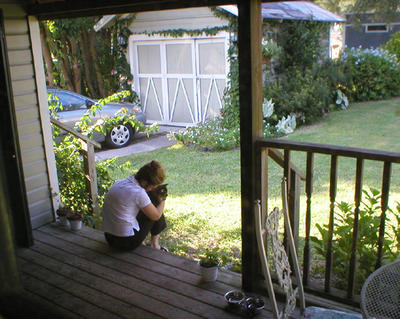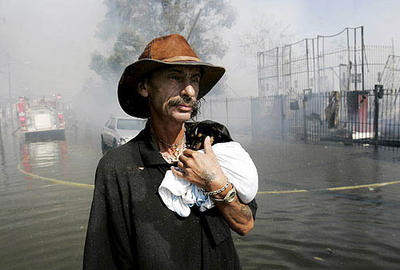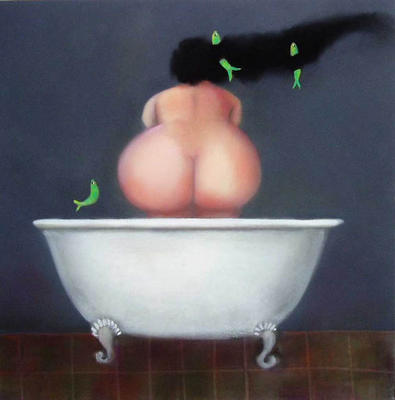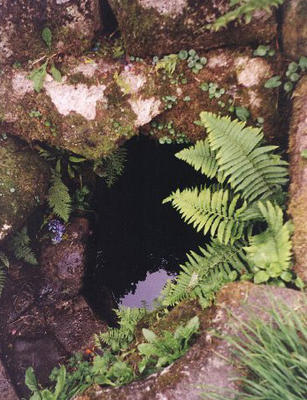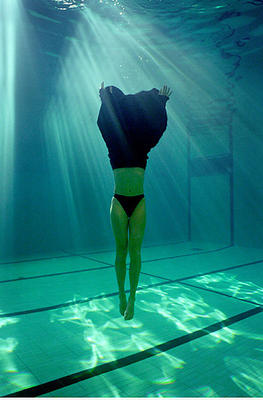
A long, migraine-plagued, hot-but-not-humid, intensively software-challenged week, Ophelia strolled north now singing to dead loves further on, John Roberts the stealth justice-to-be droining like an unresponsive autmatom to queries from Democrats, bodies slowly being dredged and bagged in New Orleans, Bush the isolate American king addressing the United Nations, extolling the virtues of unanimity of purpose (his), my wife working many hours on a custom job, praying it will seed more jobs to come, our cat Violet friskier in the ebbing of light, sensing A Change before it does much to the mercury, some of the plants in the garden of a paler, receding, tired green, & me here tired, worn out, productive, happy ...
These attempts at literate writing -- making worlds out of words, rowing toward origins, singing of love and its bluer baptisms into a longing deep as the sea -- are founded upon a sacred history: the myth inside the story. Being mythic, that history is both narrative and primal, linear yet circular, milking a heavenly sweetness from the shore where memory found blue mammaries, where I and Thou came together, O, only for three nights of eternal love on that crashing land beneath the wave.
As myths go, it’s pre-Christian, arriving after my crisis in faith in which I threw out the baby Jesus but kept the bathwater of Mary. (That’s my mothers name, as was His.) As myths go, its also pre-Christian, a way forward that travels further back. As myths grow, it is the circumference of an age which is trying to birth out of a dated Christian heritage into a later primitive origin, out of Columba back into Oran, now with icier eyes, more sabled harmonies.
Over and again I press my face to that rounded template, saying the words again and again, repeating the story, shouting again its hosannahs, washing my day-wearied mind in its saline noctilucence, readying my day by hooking up that ghostly matin umbilicus, part ocean, part mother, part God, part lover, all anima, so that exaltation may permeate my dry, aging, mortar, that I never lose the blues which bittersweetly saved me from the eternal internal, which bid me sail forever in search of that lost numen who occupies with each transit a greater and greater whole of my heart.
September 15 is an anniversary of sorts that I have marked over the years--it’s when one of my great passions said goodbye to me (in 1982), turning and walking away from me, slamming the door on my love, stranding me far far out to sea of a feeling which baptised and compulsed and shattered my shores ... That event reprised an earlier love which ended the same way, disastrously for the heart which said
yes so wantonly and essentially, foolishly (as every young soul is) and stubbornly nailing the inward goddess to a mortal frame, a fellow human who could only be errant and capricious and self-mired and gone.
Each year at this time I stand in the belfry, hauling on the ropes of my sacred history, tolling sweet and bitter bells at once; that clamor comprises the wave’s incredible rise and smash in orgasmically annihilate foam erasing my every boundary and limitation, and then the entire ebb of that wave leaving me broke and raw and eternally infernally empty and alone, a cathedral echo-chamber of the sea which choired loudest in losing her for good. So a music attends this story, gorgeous and terrible, too sweet for human lips and unmitigated in its perilous gall, like a booze, like the kiss of a goddess, like every word which comes within a gossamer breadth of finding her again only to turn and watcher her fade forever away once more.
The song which framed my grief, like a template, back in ‘82 was "September 15" by the Pat Matheny group (from
As Witchita Falls, So Falls Witchita) Lyle Mays the keyboardist dedicating the song to the memory of the great(er) jazz pianist Bill Evans, who had died the year before -- on Sept. 15. So the song I fell in love with and took as my anthem for those grief-stricken, achingly beautiful days of loss was itself totemic of masters who had gone before, a sacred history of one song flowing from many hearts. That’s poetry, or what I choose to think of it today, and here are the ones which herald the sacred half of my tale.
***
DREAM GAL2002
Only the simple things aren’t as good—
the smiles, the kisses, showers, hugs.
And I don’t dream. — Journal 1978
Can you arch a life out
of one embrace, the parabola
so brilliant to half-life even
here, 22 years later? I doubt it.
For whatever reasons,that
first love opened me to
my wilder, harsher, greedier
self, terrifying in its
freedoms & witchings.
I knew Becky for so short a time—
just a weeklong tryst—
I can’t even see her face
though every atom in me
pled for years to look on it
again and hence. Blonde hair
parted in 70’s fashion—yes—
brown eyes, not blue—
that voice of Southern honey
descending into molasses,
lazy, pure hammock — yes, yes—
her Buster Brown shoes stepping
over a wet curb in downtown
Spokane as we walked to
a restaraunt by the river.
None of that however adds up
to what streamed round her
into me, as if she were standing
in that river we watched as we ate,
yanking all my salmon chains.
Can eternity fit in the softest
and most temporary brush of lips
on some cold dawn, a sleepy
heat rising from two bodies still
glued together from the previous
night’s clench? It must, because
something of that last morning
we woke together before she
drove off to LA wakes here—
not the passion, not the take
on love a loveless, 20-year-old
boy could possibly imagine
waking at last in the arms of
a true Beloved—a clear blue space
I woke to that March morning
with every impossibility strewn
around the room. I was no longer
a solitary, wolf-torn of winter nights,
but reborn to summer waters
which have never drained away.
THE NAKED TRUTH2004
Marcus, a student of the gnostic
Velentinus (c. 150), relates that
a vision "descended upon him ..
in the form of a woman ... and
expounded to him alone its own
nature, and the origin of things, which
it had never revealed to anyone,
divine or human."
-- Eileen Pagels,
The Gnostic GospelsMy birthday in the summer
of ‘82. She appeared at the upper bar
out of nowhere, fanning through
the smoke and blaring rock
as if stepping from that wave
ordained to drown me with
every blue fury in the lap
and chest of Love. We talked
a while nursing beers in
the wild din, her voice and
mine forming a bower
in which some goddess awoke,
aroused, and laid hands
on us, ushering us into woods
to sacred for a name.
And left us there, in
reverence for a secret
only we could reveal
and revel when all
our clothes fell like
angels to the floor.
Much later that night --
in fact well into the
next morning’s too-
bright hot summer light --
She smiled unbuttoning
her tropic blue blouse,
and unhooked her bra with
that hidden gesture,
freeing her full, pink-
nippled breasts, startling
me more awake than
I had ever been: And with
eyes locked on mine
came close, to softly
weave her chest against
mine, whispering
O
make love to me. Oindeed: And so I did,
a half dozen times or
more that too-late-night
which had crashed
so dreamily on the next
day’s shore, licking her
to sweet moans once
then twice, getting sucked
off, fucking slow and
long in rhythmus
to a secret beat
which was new even
to God. We could not
stop entering and
collapsing in each
other, leaving selves
and hours far behind;
thus we drifted
so far offshore as to
never quite return.
Ever. But as a
mortal pair we fared
quite poorly, and in
weeks she jilted
the needy, greedy,
angst-ridden boy
I had become, walking
back into the night
for good. After all
these years, I mark
this day -- Sept. 15 --
as the tolling of
her wavelike recede
from the ecstasy of
my life, my feet forever
thence half in a surf
which once proclaimed
our naked name. Fare
thee well, lost lover.
The child you said you
begged of my seed
our second night
would now be 23,
and perhaps he
or she is here,
cuculattus of that
high blue wave
which crests in every
"Yes!" God gives
me truth to shout.
Whenever I hear those
old Journey songs
from 1982, I go back
to that first unveiling
hour, in thrall
and surrender to
the whole fantasy
of love and lust,
believing it more
than Truth itself. That
fictive beach where she
and I came hard
calling each other’s name
remains here, built
up with the ground
bones of every other
love I’ve sung,
sustained now by
the long, perhaps
my life’s remaining
duration with the woman
I call my wife by
day and blue welling
deep down the
pike of night.
Our hearts are
more naked now
than our bodies
may be allowed to
go: Mere angels
can’t fly this naked reach
which is part dream,
part ocean beach,
part clear blue sky
inside you and I.
 ANNIVERSARY
ANNIVERSARYSept. 15 2002
Today it’s been twenty years
since I lost the second woman
I hardly knew yet I loved
in full, stupid, jealous & greedy.
In losing her I became
so desperately and infernally
alive as to beg silence: her shade.
All I remember of her today
is that morning we walked
on Cocoa Beach after fucking
most of the night. We were
making small talk in our
dreamy exhaustion—laughing
at the way sandpipers scurry
like tiny execs— when she
paused and smiling at me
in front of dawning sea.
The whole package I recall—
that smile, the blue eyes streaming,
the curly blond hair in a halo
of sun, her breasts full
and straining against
a year-old bikini top, the
sea crashing light foam
at her ankles like cream,
that evanescent breeze—
all of that was greater than
any morning, a finally found key.
Yet that was only true
in reverse, when she told
me at last to go to hell.
but in reverse. I recall
how I hurt bad enough
in the proceeding months
to see beyond the heat
into caring at last about
how I lived love.
How the days slowed
in the viscosity of grief,
a sludge both anguished
and gorgeous, slowing
the day to a wave-crawl,
the sunlight lengthening
across the lakes.
That image spoiled my drinking
for the next 4 years
though I tried, reaching
for her on every tree.
to care last about how
Eventually I came to
marry that shape,
sacrificing the wild
night of making love
for long hard days
of patient making.
Love doesn’t teach us
how much there is to
gain in love, only
how much there is to lose
by not loving, or failing
to love well enough.
Today I recall those long
burnished days in September
when grief was a tide
tolling a sea
I’d been born to in losing.
Stupid, jealous, greedy,
it’s true, but also the wound
which eventually bled me real.
I sit in the house I prayed
that day to inhabit,
the sum of every surrender
I made to love’s brine,
it’s awfullest, most
incompetent son,
each smile a wine
so much more difficult now
so much more
what she only kissed.
THE KISS...Alpha continues to begin,
Omega is refreshed at every end.-- Wallace Stevens,
"An Ordinary Evening
in New Haven"
Orpheus didn’t lose his
beloved in hell,
he failed to retrieve
his song of her.
The music which hallowed
her pale hair for all time
turned hollow inside
him, the night turning
rude and cold as
brute winds whistled
tunelessly through her
ribs. Rilke went down
there for years in
search of his Elegies,
lost in 1914: a sudden
great flapping lost just
a beat and then disappeared,
his poems turning
weary and poor, none
he carved after
cathedral enough
to recapture her sound.
How was it she smiled
one day in the full
wonderment of wheat
and unveil to a kiss
in the hymeneals of
spring and just
falter that brush,
withering and draining
to a bold blotchy
winter filled with those
bad nights no
other oblivion can
garrot enough.Insomniac,
lonely, horny, with
history whispering
up from the vents --
How could it all
end right there on
the iciest banks of Hell?
My cap and bells are lined
with red velour, scarlet
like the bright satin maw
of a vampire’s black cape.
I chase every poem’s
fancy to the highest
sea-cliff where she always
get lost in the wind’s wail
and roar of the surf too
far below. The sea mauls
and mashes the end
of every love song.
We never get her back
though we die trying.
I sail forever toward her
turn to me that spring day,
singer and song cupping
the shapes of her bliss,
our forfeit that quatrain
which ends with a kiss.
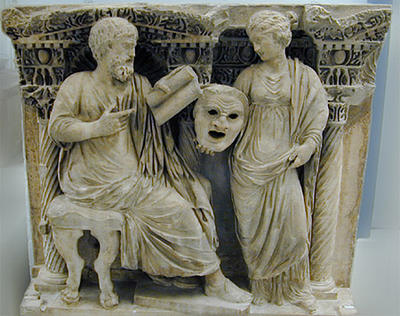 THAT STRANGE,
THAT STRANGE,
SWEET MUSICI heard that strange sweet music
between my mother and the sea
and was thus called to voyage
toward a happy ever island
where the women and the harps
weave one lasting song,
inside and behind and under
this ordinary strand of trials.
An apple branch was seared
across my heart’s dream
so far away on salt wave-backs
of seem which margin fields
of wheat, each dolphin in the
foam a horse on high steppes
leading me toward that home
I’ll never fully live in, though
each poem shapes both prow and
hoof. Surely I am only sitting
here in the blue washes of early
Sunday light, the cats now
restless to be let out and
my wife stirring upstairs:
Surely I am only scratching
in a composition book yet again
waves of ink across the page,
faithful in the foolery which
tries to make of words a whirl
of hair and breasts and eyes
which also surely call me from
a distant beach only my heart
has ripened ears to hear:
Surely she begs me compose
the sand and breakers
and strangely singing sky
which frames her standing
there with the tide ebbs
over her feet and pulls
the moonlight to the branch
she’s holding out to me, a
glittery branch of silver fire,
the one white blossom changing
as I watch into one red apple
which is both kiss and nipple,
hull and prayer, sea and shore
which I must name here best as
I can: Surely though all words
fail me and I age from these
years of fruitless and bittersweet
enquiry, never quite reaching that
happy isle though my well
is filling the song she wove in me
when I was born, when I heard
my mother call me at the beach,
when I saw a girl playing in the
yard of a house down the street,
when I first lifted a young woman’s
blouse when we were in our teens,
her breasts like pale soft fruit
of that glowing silver branch
which hangs over me just out
of reach no matter how much
I row or rage or ever revise.
Surely she’s the music which
haunts the curving wave I am,
and this poem is that song
which no church or science
can ever save, her white beach
the psalm curls heaven in
a bed I always almost reach:
Surely at least and only here,
on these fading paper sheets
which in my ending
we’re allowed to faintly greet:
lips to her lips I here press
in the infernal ocean of our undress.
LYLE MAYSListening to Lyle Mays
as I have these past
20 years has frequently
been like swimming in
sweet waters: immersion
in a uteral plenitude
with all the time in
the world: Yet his
gorgeous keyboard
arias turn bittersweet
in the sad knowledge
of how little
they truly move or
matter or rescind
the human day:
His ripened ecstasies
are almost deadly so:
Music for the lover you
dreamed of all these years,
with soft sea eyes
and impeccably spread hair:
Drops of lost mother’s
milk dribbling
from the notes:
Pure, inconsolable
nourishment. Of late
I’ve popped the "Solo"
(1998) CD into the
player of my rental
Grand Am and driven
to work and back
inside a lush, becalmed
sheath. Sometimes
I feel stilled as a baby
returned to her
eternal beach: Other times
I want the other tit,
with its dark juice
anticipating perfectly
met desires. I don’t know
whether his music
blesses or braces
the life I choose:
Completes or collapses:
Breaks me open
like a rash of sweet
jasmine or caulks
me shut in a calyx
of ice: Both I
suppose: It’s my best
and worst music,
the way I listen
to Lyle Mays,
so sadly earnest,
so resigned to
an ineffably
impotent sigh:
My wife can’t stand
to listen to it,
says it depresses
her to no end:
Can there be a goodness
in the music of falling
angels? In the heart’s
impeccable and
unbreachable desires?
Is there any truth
to narcotized traffic,
to the Florida day
infused with an
aural hoar? Does such
Longing ever finish
braiding her Lament?
I don’t know, but
this music is surely
one of my names,
the sum perhaps
of what is in every day
that can’t be touched
though we wish to,
oh, infinitely so.
Pandora’s box
locked in the roots
of my ear-heart
with its one
consoling content
singing back to
Lyle’s sweet piano
washes: my glittering,
terrible tide
with it’s too wide,
too dark mirror.
 LYLE MAYS (2)
LYLE MAYS (2)I heard your music in the
Ruin of my days -- that sad time when
I’d drunk to dregs what wasn’t there,
No draught deep enough, no bed my
Own. Lost in an ever-souring
Night, your second solo album
Came into my hearing like a green
Sprig on a changing wave -- hope at
Last of land. No, that’s not quite it:
More like uncorking a note from
An old, perhaps infinite bliss
Which resembles the wild blue sea
But isn’t. Men die every day
For lack of your sweet so dire salt.
Your soft keys sprang my ear’s deep vault.
CONCERT IN PARIS2003
Bill Evans sounded
the ocean in
a piano’s keys. Played
them like a man
holding on to his
totem fish for dear life.
Each song was
chaliced from a tide
so full of sweetness
there that just
one thimble could
smash down a
cathedral of pale
singers in its wake.
Those keyboard washes
killed Evans for sure --
a career OD on
infinitely pure and
purer chords composed
of bitter minors
and collapsing major
sevenths, pouring
in the ear the sounds
of angels in bed
praising God with
sexual wings.
Addiction was
his only defense --
who does not numb
what only God
can fully hear? The
powdered horse
post-gig, plugging
the ears with that
whiteness else
sirens swallow the sea ...
Was he any kind of
man away from those
wild keys? Could he
ever walk on dry land
with feet grown
so skilled at the waves?
Perhaps art is just
a migraine of soul,
a smoky torch wrapped
in a falling angel's wings,
surrender to the wave's
collapsing half, limned
in that cloak of mist
and foam which thunders
down a life's short shore,
forever in tumult, always
demanding more of
exactly what can never
be sustained. Every time
he found those gorgeous
places (composed of
two or three of the
same piano keys a
million players also
played but never
could sound), you
sense how beauty
shoots inward as it
reaches achingly out,
each fingered ecstasy
an arrow through
its own ripened heart.
At the Paris Concert
in '79 Evans played
with his last trio,
aged 50 and looking
much worse: he bent
over those keys the
way the moon works
the tide -- a power
above soothing
forces below. He
would be dead soon
enough from all the years
harrowed by that song,
damping down the voice
of God in every wave,
his hands obeying what
hauled him too far out,
into places more
savagely sweet than
the very sea -- "Minha"
thonged with so many
curved vowels of ocean
bliss, capping a
career careering just
offshore, just out of
reach, just where all
the angels lean against
the bar long after closing
time and try, oh try,
to shut the door
with just one more,
my friend, just one more
& all the while
cawing in the booming
hiss, flinging wide the
wild startle of the next
kiss from that piano
on a stage beside the sea,
an ecstasy whose
bottom is bottomless.
ANTITHESISSpring 1978
you wake me with a smile
I wake up from a smile
a dream dissolving
into sheets and your hair
the sad-eyed woman
standing smiling in the river
in the rivers of your smile
white wet rapids spraying in my ear
calling back my blood
my words drowning in your eyes
washed ashore drunk and empty
I dream sunrise sunset at the ocean
I Ching changes no blame
the light born and dying
your Fiat backing over gravel
backing out into silence
I walk the garden run my fingers
through a grass tuft feel your hair
the sky an ocean rain and tears
the day turning dark and cold
no blame
call it passion call it love
when you smiled
it was all the same
springtime autumn
bedspring tantra
dream within a dream
Great Wheel spinning
a game for fools
demiurge
water bearing light
wordless
I speak of love
all day long your ocean held me
sparkling on a smile
dissolving the page
no blame
HEART MUSICSpring 1978. Approaching
20 years old.
Winter freezes me because
I can’t find a heat vent
in my heart. Too isolated.
Trying to sound eloquent
but the words were all mashed
in my head. Explicating
what proved a drone. Nigh
suicidal. I knew it
but had no ladder up.
Or so I thought.
I will not die until I touch
another face, I wrote
one February night
polishing off a bottle of
burgundy & listening to
Yes revolve aerie sugars
round a brute winter night.
Later I dreamed of a
sad-eyed woman standing
in a river: the desire I felt for
her drove salmon through
her legs to die. Days later
I met a woman at a party
who became the actual
face of that woman in the
river, or it’s first human flake.
She kissed me all night.
I fell in love for the first time,
in the way of one who
comes deep in a welcome.
She left in a week. The
desire I felt all alone
kept me from writing poems
for ten years. I flapped
an finned a watery dark.
One raw spring day
soon after she left I wrote:
I will not die now that
I’ve touched another face.I became the energy of all art
which could not plant a garden
nor revel an entire summer day
without whispering a word.
The heart a salmon too brutal,
too beautiful, too ripe
for the river. Leaping wherever it falls.
HOMECOMING2002
We were having our anniversary dinner
at a restaurant we’d remembered
fondly from a previous visit—an elegant
meal artfully served—yet this time it suffered
from singularity: same place, all changed.
The bread was cold, the veal tough
and hunkered in over-brassy sauce,
the service humdrum, halfassed.
Still, you were beautiful, wearing
a simple pants suit and white blouse,
a turquoise necklace arching your neck,
your hair a perfect auburn sweep.
That night you were relaxed and
confident in our marriage, so much so
that a pricey so-so meal did not
mar all we had and meant to celebrate.
There must have been 20 highschool
girls in the room, dolled, we guessed,
for homecoming. All were in spaghetti
strap gowns, piled-up hair and triple
lards of warpaint. Distracted from
your filet mignon, your eyes were both
amused and paternal, watching girls
rise in twos and threes from their tables
to head for bathroom, walking past us
giggly and flushed in the grandeur
of all first wave-steps to the world.
Neither of us went to homecomings when
we we were young, nor cared much to;
nor will we ever send a child of our own
off to such a night. But still it was a treat
to watch this high mass of dressing fine
by women still too much girls ashine
with possibility, the night brushed with
only the faintest blue of every bruise to come.
Well—interesting for a while, but youth
too quickly makes a drone of its spree,
and you can only linger for a short while
around nostalgia’s flame. We ordered
tiramisu to go and drove home, climbing
into bedclothes to watch "Trading Spaces"
—those pinch-a-penny makeovers
a guilty, minor pleasure in the later
duration of our married life, sustained now
by all we slowly painted over when wooed
nights slipped from view, trading a host
of first-blush hopes for this house
which filled with what we thought we
were, then lost, and what despite us grew.
ONLY THE SONG2002
Music is the memory of what never happened.
— Jack Gilbert
Only to the humble does the dream come,
and contained in the dream, there is only the song.
— Papago saying
As a poem dips in dark waters
to ink seal-ichors,
God’s wild nib
unharbors the ocean
from these ribs.
I held that blue music dear
bellowing down the
wine-press of bitter nights.
He seeks the ocean
whose kisses parch and bleach.
I didn’t ask to end up here
but I give thanks every day
for the next draft,
the next siphoning prayer.
Such psaltery is
my daily sump, your alms,
our merry brine: oblations
of whatever fins there,
fish or mammal,
man or Manannan.
Sirena of this restless tide,
your errant son returns
to fight this losing fray,
epically crossing out
all but the music
which crashed all night
and remains. Clasp this
to your breast
like a locket or a cross
or a lover’s tired head.
This song is conched
from your deep bed
and dropped on a pink shore.
Marry your ear to my making:
inside these curved lines
your dark womb calls — no,
demands — for more,
even though it’s just one song,
even though I always get it wrong.

